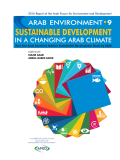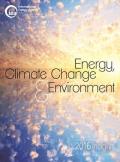As the world moves on from the climate agreement negotiated in Paris, attention is turning from the identification of emissions reduction trajectories—in the form of Nationally Determined Contributions (NDCs)—to crucial questions about how these emissions reductions are to be delivered and reported within the future international accounting framework. The experience to date shows that, if well designed, emissions trading systems (ETS) can be an effective, credible, and transparent tool for helping to achieve low-cost emissions reductions in ways that mobilize private sector actors, attract investment, and encourage international cooperation. However, to maximize effectiveness, any ETS needs to be designed in a way that is appropriate to its context. This Handbook is intended to help decision makers, policy practitioners, and stakeholders achieve this goal. It explains the rationale for an ETS, and sets out a 10-step process for designing an ETS – each step involves a series of decisions or actions that will shape major features of the policy.

This AFED report on "Sustainable Development in a Changing Arab Climate" recommends an alternative approach, based on integrating sustainable development principles within the anticipated rebuilding efforts. It calls upon local, regional, and international aid organizations not to limit their efforts to providing safety and basic necessities to those affected, but rather to use the relief plans as a launch pad for promoting new approaches to development, rooted in a transition to green economy.
This report, on prospects and challenges on the path towards achieving the SDGs, builds on the previous eight reports on the state of Arab environment, produced by the Arab Forum for Environment and Development (AFED) since 2008. AFED annual reports have so far addressed major development issues in the Arab region, including Water, Food Security, Energy, Green Economy, Ecological Footprint, Sustainable Consumption, and Climate Change. The report highlights the policy options available for the Arab countries to realize the Sustainable Development Goals by the 2030 target set by the United Nations, in light of the new political, economic, and social developments.
The paper explains the findings of the MC3 Project (Meeting the Climate Change Challenge). This project brought together over 100 researchers, practitioners, civil-society leaders, and policy-makers, led by researchers from Royal Roads University, Simon Fraser University, and the University of British Columbia, with 12 major research partners from the public and private sectors, including the Union of British Columbia municipalities. Researchers conducted a detailed evaluation of 11 leading, yet different, municipalities across the province to identify the leading innovators and innovations on climate action. The case studies revealed the following key drivers of innovation, in order of prominence: the legislative and policy framework, supported by provincially led incentives and tools, access to partnership funding and intermediary support, and framing the issue as critically important.

The historic Paris Agreement on climate change sets the course for a fundamental transformation of the global economy over the next decades. The Agreement’s overarching goal of limiting global average temperature rise to "well below 2°C" will entail profound changes in the global energy system. Achieving the deep cuts in global carbon emissions that this vision requires is no small task given the enormous challenge of implementing – and eventually exceeding – current country climate pledges. This publication examines key sectors, technologies, and policy measures that will be central in this transition to a low-carbon energy system. It addresses the following questions:
Africa stands at the threshold of a tremendous opportunity: its economies are seeking to shift to higher productivity sectors which can boost prosperity and drive developmental goals. At the same time, the right kind of economic transformation can also ensure that Africa’s growth is sustainable and resilient in the face of the increasing impacts of climate change.
This report offers key insights for policy makers seeking to deliver better growth and a better climate in African countries. It aims to help decision-makers take stock of the region’s recent experiences and draw lessons for the future. In particular, it seeks to crystallise ideas on how to harness the forces of economic, social and environmental change to accelerate inclusive and sustainable development across the region.
For Africa to achieve this better growth, the report identifies five action areas for governments to consider as they formulate development strategies and action plans for the future. These are:
